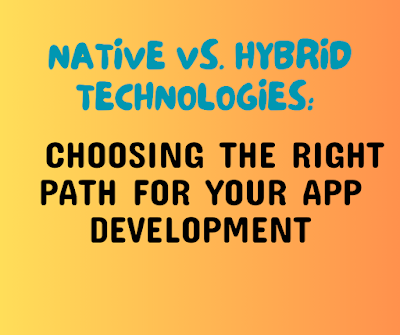Native technologies and hybrid technologies are two different approaches to developing and deploying software applications, particularly for mobile and web platforms. Each approach has its own advantages and trade-offs, and the choice between them depends on the specific needs and constraints of a project. Here's an overview of both approaches:
Native Technologies:
- Native technologies involve developing applications specifically for a particular platform or operating system. For mobile apps, this typically means using the platform's official programming languages and development tools.
- In the context of mobile app development, iOS apps are developed using Swift or Objective-C for Apple devices, while Android apps are typically built using Java or Kotlin.
- Advantages of native development include access to all platform-specific features, performance optimization, and a consistent look and feel that matches the platform's design guidelines.
- Native apps can be distributed through app stores like the Apple App Store and Google Play, making them easily accessible to users.
Hybrid Technologies:
- Hybrid technologies involve building apps that can run on multiple platforms using a single codebase. These apps are typically developed using web technologies (HTML, CSS, JavaScript) and then wrapped in a native container for deployment.
- Popular hybrid development frameworks include Apache Cordova (formerly known as PhoneGap), React Native, Flutter, Ionic, and Xamarin. These frameworks allow developers to write code once and deploy it on multiple platforms.
- Advantages of hybrid development include faster development, cost-effectiveness, and the ability to target multiple platforms with a single codebase.
- However, hybrid apps may not offer the same level of performance, access to platform-specific features, or native look and feel as native apps. They may also require additional effort to ensure consistent user experiences across different platforms.
Key Differences and Considerations:
Development Technology:
- Native Apps: Native apps are developed using platform-specific programming languages and development tools. For example, iOS apps are typically written in Swift or Objective-C, while Android apps are written in Java or Kotlin. This means you need to write separate code for each platform.
- Hybrid Apps: Hybrid apps are developed using web technologies such as HTML, CSS, and JavaScript. They use frameworks like Apache Cordova, Ionic, or React Native to wrap the web code in a native container. This allows developers to use a single codebase for multiple platforms.
Performance:
- Native Apps: Native apps tend to offer better performance because they are optimized for the specific platform they are running on. They have direct access to device features and can take advantage of platform-specific hardware and software optimizations.
- Hybrid Apps: Hybrid apps may have slightly lower performance compared to native apps since they run in a WebView or a native container. However, advances in hybrid app frameworks have improved performance over time, and for many applications, the difference may not be significant.
User Experience:
- Native Apps: Native apps can provide a more consistent and polished user experience since they adhere to platform-specific design guidelines. They can take full advantage of platform-specific UI components and animations.
- Hybrid Apps: Hybrid apps may not offer the same level of design and user experience as native apps, although modern hybrid app frameworks have made great strides in improving UI/UX consistency across platforms.
Development Time and Cost:
- Native Apps: Developing native apps for multiple platforms typically takes longer and requires separate development teams for iOS and Android. This can lead to higher development costs.
- Hybrid Apps: Hybrid apps can be faster and more cost-effective to develop because you can use a single codebase for multiple platforms. However, you may still need to write platform-specific code for certain features or optimizations.
Access to Device Features:
- Native Apps: Native apps have direct access to all device features and APIs provided by the platform, which allows for more extensive and efficient integration with hardware and software features.
- Hybrid Apps: Hybrid apps can access device features through plugins or native modules, but there may be limitations in terms of performance and available features compared to native apps.
Updates and Maintenance:
- Native Apps: Each platform requires separate updates and maintenance efforts, which can be time-consuming and costly.
- Hybrid Apps: Hybrid apps can be easier to update and maintain since changes to the codebase can be applied to both iOS and Android simultaneously.















